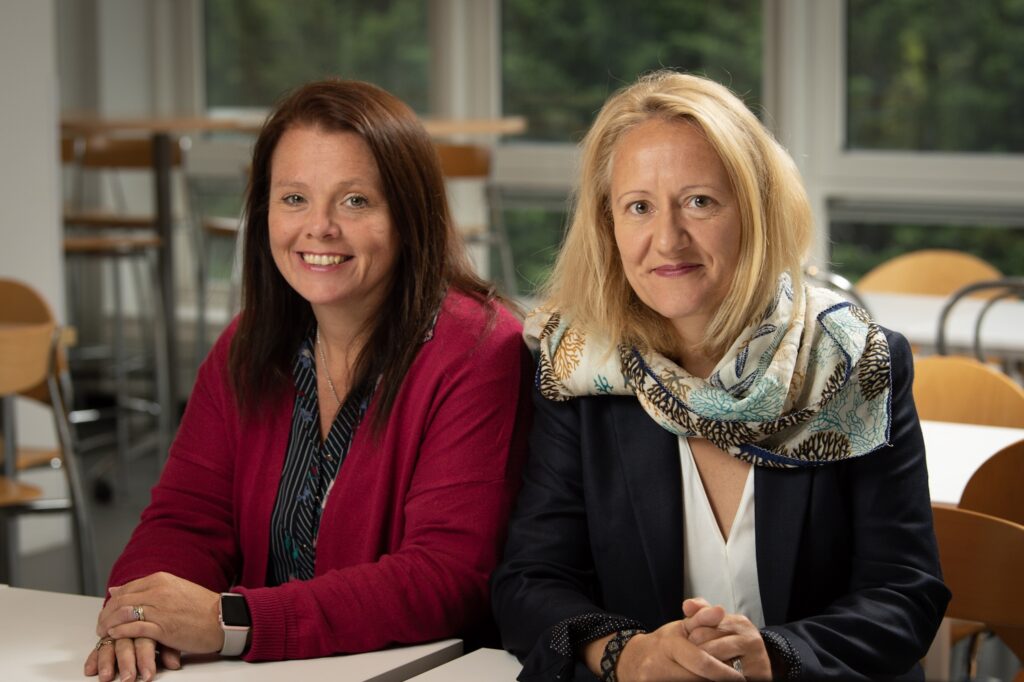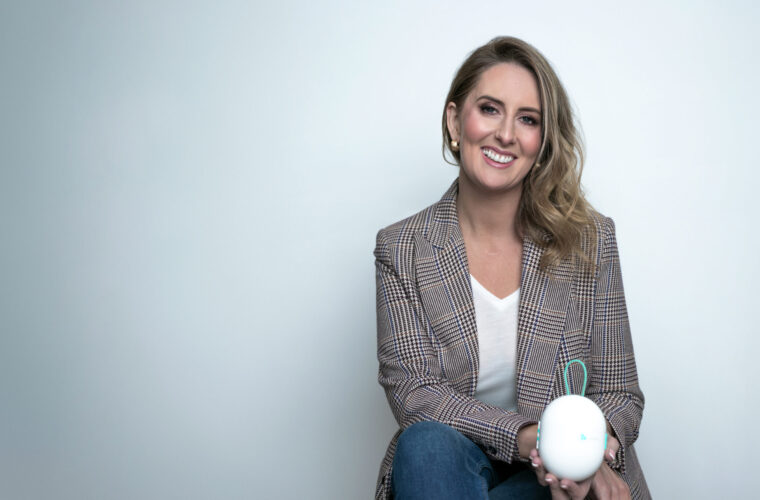It’s testing times for everyone inside and outside the tech world. Not only are talent shortages an ongoing issue, but proving qualifications and candidates have what it takes to secure a coveted role has become even more complex in a hybrid working world.
Assessment processes and testing potential employees prior to making a job offer are experiencing a digital makeover lately. One co-founder taking the ‘extra’ out of exams and digitising assessments is Louella Morton, co-CEO and Co-Founder. Alongside her business partner, Sheena Bailey, the pair have created TestReach, an all-in-one testing solution.
Their cloud-based technology enables users to create, deliver and mark any assessment, making the entire process seamless for all involved, from formative tests to high-stake formal exams.
Entrepreneur Louella is also an ambassador for the Going for Growth programme in Ireland, which is designed to support women who are serious about expanding their businesses.
As part of our female founders series, we asked Louella all about the concept, exam stress and the most challenging parts of being an entrepreneur.
First, tell us a bit about yourself, where you are from, and where you worked before establishing TestReach.
I’m from Dublin and still live there. When I left school, I did a degree in Computer Science at Trinity. From there, I joined the AIB graduate recruitment scheme and did programming for a few years, after which I moved into IT consultancy with Deloitte, where I had a lot of clients both at home and abroad. It was at this stage that I moved more into the business and commercial area. For my next roles, I was lucky enough to work as Channel Sales Director with Adobe, VP of Sales with WBT and then Qstream.
What was it that inspired you to establish your own company?
I was always interested in starting my own business, but it would never be something I did on a whim. I already had a very successful career, and I progressed quickly. This provided me with a lot of exposure to many different areas of the tech industry, from my early days programming to managing delivery projects through to the business, commercial, and contract sides. As my career advanced, I became a lot more experienced and confident in my abilities to do it for myself.
Before TestReach, I was Vice President of Sales for an enterprise software company—a small part of the system allowed for the creation of simple MCQ tests and quizzes. One day, a customer phoned me and asked if they could run a quiz over Skype (it was the first mainstream video call software at the time!) to ensure the person didn’t cheat. I remember it as a lightbulb moment. It enabled me to run formal exams online, eliminating the need to travel to a test centre and offering a huge degree of flexibility and scalability. I immediately knew that this was an idea that I could turn into a solid business concept. I spoke to an acquaintance at the time, Sheena Bailey (now my Co-Founder and co-CEO), and we developed TestReach together.
What challenges did you face along the way, and how did you overcome them?
When we started the company, one of our biggest challenges was that our offering was completely new and quite different. Most people had never seen anything like it. Exams have been run in test centres for over three thousand years, and we were introducing radical change into an industry that can be very conservative and risk-averse. It took a lot of patience and relationship building to get to a point where initial users were prepared to come on board and try it out. We also ran many trials, where people were able to experience the software first-hand so they could see how comprehensive and easy it was to use. Most importantly, this new concept of doing exams remotely and virtually actually worked!
In your own experience, what’s the hardest part about being a female entrepreneur?
Well, I am a vocal advocate for female entrepreneurship and provide a lot of advice and mentoring in this area. I think many females have great ideas and are more than capable of successfully starting a business; however, sometimes, they lack the high degree of self-belief needed to see it through. When starting any business, you regularly encounter people who question what you are doing or don’t think it will work. Females are more likely than their male counterparts to be impacted by this kind of negative feedback, which can cause self-doubt. It is essential to have networks and interventions in place to encourage female entrepreneurship so that females have the support they need to motivate and guide them through the end-to-end process of creating a sustainable business.
What are the biggest challenges in digital exam management?
Qualifications and examinations can be stressful because the stakes are very high, and candidates are under significant pressure to perform well. Balancing the level of pressure on candidates with stringent requirements of accrediting bodies can be a significant challenge. I think that online exams really help ease some of the stress experienced, as candidates often find taking an exam from home to be more comfortable than travelling to a test centre. At TestReach, we also provide a well-trained and supportive team that ensures all candidates have a positive exam experience.

Do you believe online assessments are the way of the future? Could we soon see an end to physical examinations?
There certainly are many significant benefits to running exams online. Just some of them include flexibility, reduced administration and scalability, and a reduced carbon footprint, so the reliance on paper-based exams is continually decreasing. We’ve done calculations, and at this point, TestReach contributes to a reduction of 150,000 tonnes of CO2 per annum across our client base by decreasing travel, printing, and shipments associated with physical exams.
In addition, there are other key benefits, such as accessibility. For example, someone with a visual impairment can use their own screen reader or specific styling for the look and feel of the exam. This kind of personalisation is much harder to do with a physical exam. In the future, we’ll see that most examinations will become computer-based with a hybrid delivery approach. I see a future where some exams are taken from home using remote proctoring delivery while others still run in test centres.
Please tell us a bit about the technology involved in running TestReach.
TestReach is a cloud-based solution that provides organisations with modern technology to remove the strain, logistical headaches and expense of running face-to-face examinations. It does this by enabling secure examinations to be run online. The application covers the full end-to-end assessment process, including question authoring, item banking and exam paper assembly. Post-exam, we can also do online marking, pass marks and question moderation. Following each exam, we produce detailed business intelligence dashboards to analyse both exam data and performance. This wide range of features is extremely useful to our customers to manage the security and quality of their qualifications.
What advice would you give to budding female entrepreneurs considering setting up their own business?
I would tell them to do it, as running your business is incredibly rewarding. That being said, although it might sound obvious, ensuring the business is viable is critical. Entrepreneurs need to ask themselves if customers will spend for what they are doing or creating, and if so, will they definitely pay more than what it costs to produce or deliver? Sometimes, people only look at their offering from their perspective. Understandably, this is often subjective, as a lot of emotion is tied up in trying to create something new. It is crucial to be objective and critically look at the offering through the lens of a prospect. Founders need to think about the value proposition and how much it’s really worth, as the commercials are as important as the offering itself.
Have online exams grown in popularity since COVID? If so, why do you think that is?
Yes, online exams have become more popular since COVID-19, as technology adoption accelerated during this time. Online exam software was essential during the crisis to enable examinations to continue. Specifically, e-proctoring was necessary, as test centres could not function under lockdown conditions because people could not congregate indoors. With the TestReach remote proctoring, exams could continue because candidates could sit their exams in the comfort of their homes. Still, test integrity was maintained through our live proctoring service. This means supervisors remotely monitor exams online via video, audio, and screen share connections. At the time, we ran many essential exams across a range of different areas, including medical, banking and insurance. Post-pandemic, most organisations have continued with the use of computer-based examinations and remote proctoring, as they now have experience with how effective and efficient it is in practice.
And finally, in your opinion, what does the future hold for TestReach?
We just celebrated our tenth anniversary at TestReach, which was a significant milestone! We now run over four million exams per year in over 150 countries. Our ambitious growth plans will see us significantly increase the number of exams we run through expansion in our current customer sectors and also geographically.



